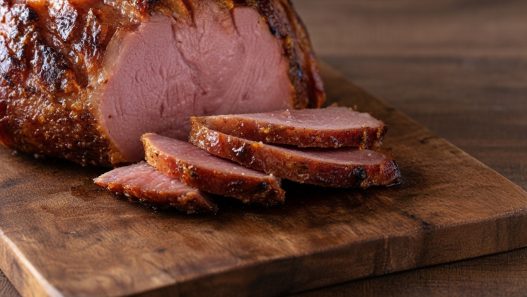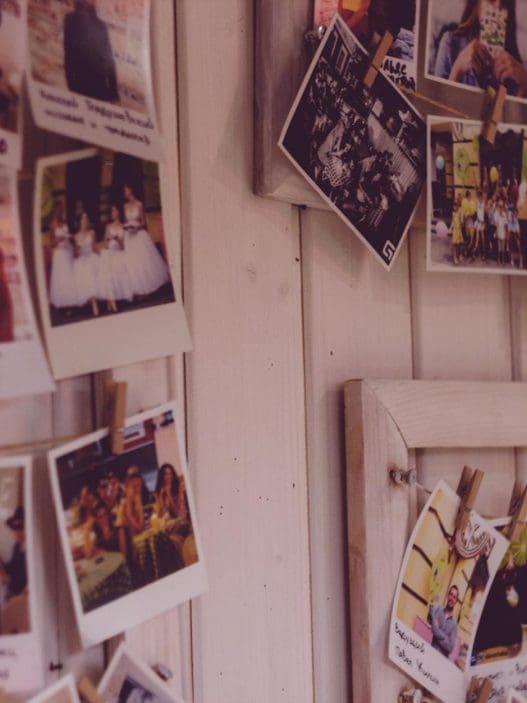Attending a funeral or memorial service is an important way to show respect, support, and sympathy for the deceased and their loved ones. Knowing what to bring to a memorial service can sometimes be challenging. This guide provides detailed advice to help you make thoughtful choices that will be appreciated and remembered.
Table of Contents
Common Gifts & Tokens To Bring To A Memorial Service
Thoughtful Gifts To Bring To A Memorial Service
Practical Contributions To Bring To A Memorial Service
Personal Touches To Bring To A Memorial Service
What To Wear To A Memorial Service
Using Digital Condolences For A Memorial Service
Planning to Attend A Memorial Service
Supporting the Bereaved During & After A Memorial Service
Long-term Support After A Memorial Service
Common Gifts & Tokens To Bring To A Memorial Service
There are many memorial keepsakes and gifts you can bring to a memorial service. Below we have listed some popular choices:
Flowers
Flowers have long been a traditional and widely accepted gesture of sympathy. They convey respect, love, and remembrance. When selecting flowers to bring to a memorial service, consider the preferences of the deceased and their family.
If the deceased had a passion for dried flowers, then a bouquet of dried flowers is the perfect way to honor their memory.
However some common & favourite flower choices to bring to a memorial service include lilies, roses, and chrysanthemums, each carrying different symbolic meanings.

Symbolic Meanings of Flowers
- Lilies: Often associated with the restoration of the soul of the deceased to a peaceful state of innocence.
- Roses: Red roses symbolize love and grief, while white roses represent purity and reverence.
- Chrysanthemums: In many cultures, chrysanthemums represent death and are exclusively used for funerals and graves.
Sympathy Cards
A heartfelt sympathy card can provide comfort to grieving family members. In your message, express your condolences, share a fond memory if appropriate, and offer your support. Personalizing your message demonstrates genuine care and thoughtfulness.
Crafting a Heartfelt Message
When writing a sympathy card, it’s important to be sincere and compassionate. Here are some tips:
- Express your sympathy: Begin by acknowledging the loss and expressing your sorrow.
- Share a fond memory: If you knew the deceased well, share a positive memory or anecdote.
- Offer support: Let the bereaved know you are there for them, whether it’s for a chat, a helping hand, or any other form of support.
Ideas For Memorial Donations
Instead of flowers, many families prefer donations to a charity or cause that was important to the deceased. It is important to check the obituary or contact the funeral home for information on the preferred charity or donation the family would like you to make. Making a donation in the name of the deceased is a meaningful way to honor their memory.
Below we have listed some helpful memorial donation ideas
Choosing the Right Charity
- Ask the family: Before coming up with memorial donation ideas, it is important to ask the family. They may have specified a charity that reflects the deceased’s values or passions. The deceased may also have noted in their will who they want charitable donations to go to.
- Consider the deceased’s interests: If no charity is specified, choose one that aligns with the deceased’s interests or causes they supported. When it comes to coming up with memorial donation ideas, think about the deceased’s passions in life. Did they love animals or were they passionate about cancer research? Thinking about what the deceased was passionate about will help you make a decision when coming up with memorial donation ideas.
- Make it personal: Another memorial donation idea is to include a note with your donation that mentions why you chose that particular charity and how it reflects the deceased’s life. This will help the family or charity distinguish your memorial donation from all the others.
How Much Should I Donate At A Memorial Service
Figuring out how much you should donate will come down to a few different factors.
- Family & Close Friends: For family and close friends the normal amount to donate is between 50 and 100
- For Colleagues: You may decide to pool your money together throughout the office and make one collective donation. Between 10 – 20 is a normal amount for colleagues to donate.
- For Acquaintances: Depending on your relationship with the deceased and their family between 10 – 30 is considered appropriate.
However, your own personal circumstances will always be a factor in how much you donate at a memorial service. If you are in a situation where you can donate more or need to donate less, any contribution will be an accepted gesture.
Memorial Gifts Ideas To Bring To A Memorial Service
Memorial Keepsake Ideas- Laser Engraving
Laser engraving is a great memorial keepsake idea. It is long lasting and will likely last a lifetime. Laser Engraved keepsakes include an engraving of the deceased, so your loved one can keep it on their mantle or shelf. They can be gifted at a memorial service in memory of their death and can include an image of them, their name and date of birth or date of death. It is a beautiful and thoughtful keepsake idea to bring to a memorial service.
The 3D Crystal Square is an example of a laser engraving. This modern and sleek choice is perfect as a memorial keepsake idea. Engraved with intricate detail, it is a perfect keepsake for a memorial service and a beautiful way of keeping a loved one’s memory alive.
Beyond Memories offers high quality laser engravings of all shapes and sizes.
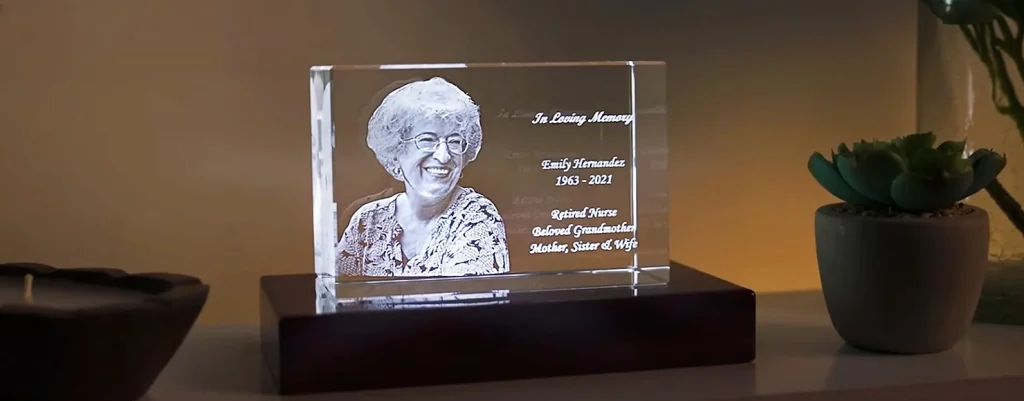
Memorial Jewellery Gift Ideas
Memorial jewelry is the perfect memorial gift idea. This jewellery comes in all shapes and sizes and can be a loving and beautiful gift to offer someone who is grieving. Memorial jewellery can often hold ashes, be engraved with a loving message or just be a simple symbolic token to offer condolences.
LoveLox offers some beautiful memorial jewellery to gift to a grieving loved one.

Memorial Gift Ideas: Charms
Charms are a beautiful small token to offer to a loved one who is grieving. They are small and discreet and are an understated but beautiful way to offer your condolences to a loved one. Small charms like these can be perfect for people who may not want any flashy gifts.
Angel & Dove offers a beautiful selection of charms and gifts to offer a loved one at a memorial service or during their time of grief. Get 10% off by using the code TMP10
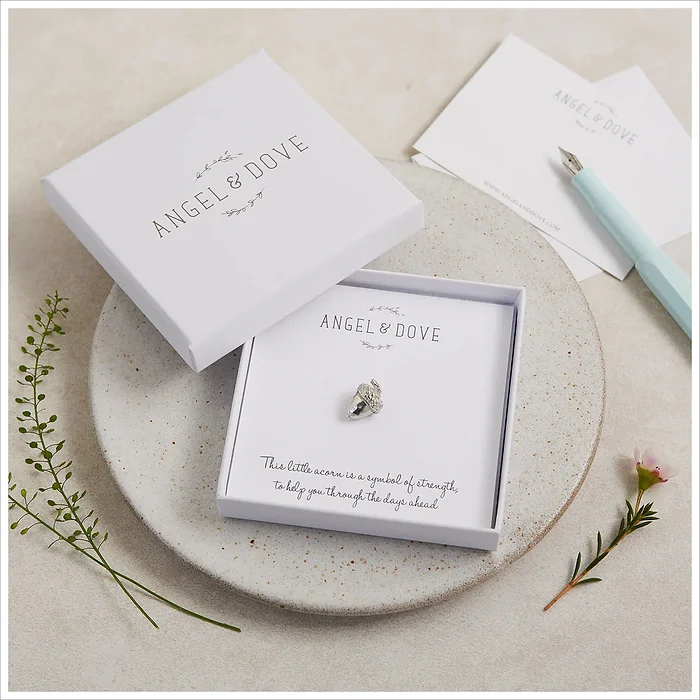
Memorial Gift Box Ideas
Gift boxes are a great memorial gift idea! You can pack the gift box with all of their favourite things. Some great things to add to a gift box could be:
- Pyjamas – soft cosy pyjamas with comfy socks are a great comforting gift to add to a gift box
- Self care products – soap, face masks, bubble bath, face creams, body creams etc
- Comfort foods – hot chocolate, pre-packed foods such as Pot Noodles, chocolate, crisps, wine, sweets etc
- Vouchers – vouchers for their favourite restaurants, cafes, beauty salons, JustEat etc
Or you can purchase a pre-packed gift box from lots of online stores who will send the gift box to your loved one, see the example from Angel & Dove below as an example.
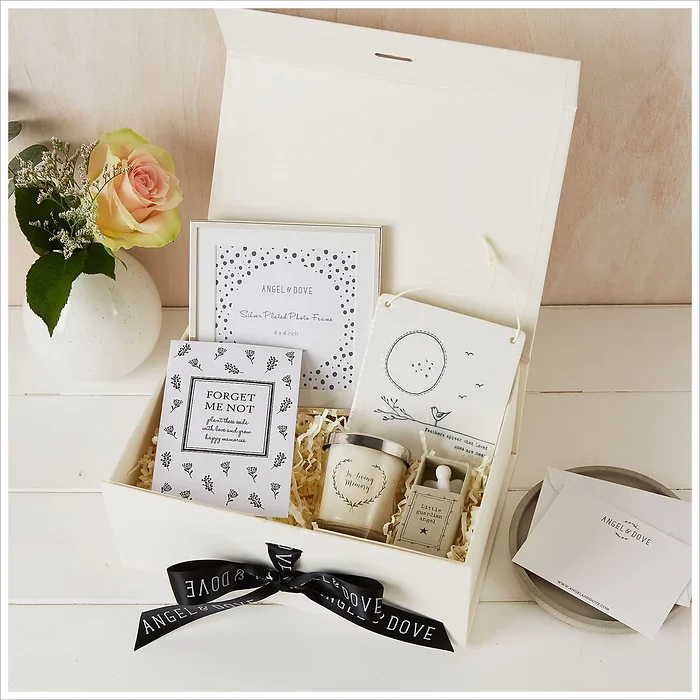
Personal Touches To Bring To A Memorial Service
Handwritten Letters
A handwritten letter can be a deeply personal and touching gift to bring to a memorial service. Share your memories of the deceased, express your condolences, and offer your support. A letter provides a keepsake that the family can revisit during their mourning process.
Writing a Personal Letter
- Start with a greeting: Address the recipient warmly.
- Share a memory: Recall a special moment or quality of the deceased.
- Offer words of comfort: Provide reassurance and comfort.
- Close with support: End with a heartfelt offer of assistance or support.
Photographs and Mementos
Photographs and mementos that capture happy times with the deceased can bring comfort to grieving family members. Consider creating a small memory album or a framed picture. These personal touches can help keep the memory of the deceased alive.
Creating a Memory Album
- Select meaningful photos: Choose pictures that represent important moments and happy memories.
- Include captions: Write brief descriptions or stories that provide context to the photos.
- Add personal touches: Incorporate items such as ticket stubs, postcards, or small keepsakes that are meaningful.
Keepsake Items
Keepsake items such as memorial candles, engraved jewelry, or custom-made ornaments can serve as lasting reminders of the deceased. Choose items that hold sentimental value and reflect the personality or interests of the departed.
Choosing a Keepsake
- Engraved jewelry: Items like bracelets or necklaces with the deceased’s initials, name, or a meaningful date.
- Memorial candles: Personalized candles with inscriptions or photos.
- Custom ornaments: Ornaments that symbolize the deceased’s hobbies, passions, or significant life events.
If you would like to look at more sympathy gifts then Angel & Dove have a huge selection of beautiful sympathy gifts perfect for a memorial service. With my code you can get 10% off your order.
Practical Contributions To Bring To A Memorial Service
Food and Meals
Providing food for the family can be a practical and appreciated gesture. Grieving families often have little time or energy to prepare meals. Consider bringing easy-to-serve dishes, such as casseroles, lasagna, sandwiches, or baked goods. Ensure that the food is easily transportable and requires minimal preparation.
Meal Train and Coordination
- Organize a meal train: Coordinate with other friends and family members to ensure a steady flow of meals over a few weeks.
- Consider dietary restrictions: Make sure to inquire about any dietary restrictions or preferences.
- Label and include instructions: Clearly label the food and include reheating or serving instructions.
Household Supplies
During the busy and emotional time of a memorial service, household supplies can be a great help. Items such as paper plates, napkins, tissues, and disposable cutlery can ease the burden on the family. Practical contributions demonstrate your care and understanding of their needs.
Essential Supplies
- Paper products: Plates, cups, napkins, and utensils.
- Cleaning supplies: Trash bags, paper towels, and disinfecting wipes.
- Personal care items: Tissues, hand sanitizer, and basic toiletries.

What To Wear To A Memorial Service
Appropriate Attire
Wearing appropriate attire is a sign of respect at a funeral or memorial service. Opt for conservative and subdued clothing, typically in dark colors such as black, navy, or grey. Ensure your outfit is modest and respectful, avoiding overly casual or flashy attire.
Guidelines for Men and Women
- Men: Dark suits, dress shirts, and ties. Avoid bright colors and casual wear.
- Women: Conservative dresses, skirts, or pantsuits. Avoid overly revealing clothing and bright colors.
- Children: Dress children in neat, modest attire appropriate for their age.

Thoughtful Presentation
The manner in which you present your gifts is important. Ensure that flowers are fresh and arranged neatly. When bringing food, present it in disposable containers to make cleanup easier for the family. For cards and letters, consider using elegant stationery.
Presentation Tips
- Flowers: Use a clean, attractive vase or bouquet wrapper.
- Food: Use disposable or easy-to-clean containers.
- Cards and letters: Use high-quality paper and envelopes, and write clearly.
Using Digital Condolences For A Memorial Service
Online Memorials
Many families create online memorials where friends and family can share memories, photos, and condolences. Participating in these digital spaces can provide additional comfort to the grieving family.
Contributing to Online Memorials
- Share memories: Post stories and memories that celebrate the life of the deceased.
- Upload photos: Share pictures that capture special moments.
- Offer words of support: Write messages of sympathy and support.
Social Media Etiquette
Expressing condolences on social media can be appropriate, but it’s important to do so respectfully. Ensure your messages are heartfelt and considerate.
Guidelines for Social Media Condolences
- Private messages: When possible, send private messages to offer your condolences.
- Public posts: If making a public post, keep it brief and respectful.
- Tagging: Be cautious about tagging the deceased or their family members unless you are certain it is appropriate.
How To Plan Ahead When Attending A Memorial Service
Confirming Details With Family Or Funeral Home
Before attending a memorial service, confirm the details of the funeral or memorial service. This includes the date, time, location, and any specific instructions or requests from the family.
Sources for Information
- Obituary: Typically includes all necessary details.
- Funeral home: Contact for information on services and arrangements.
- Family members: If appropriate, confirm details directly with the family.
Travel Arrangements
If the service is out of town, plan your travel in advance. Consider transportation, accommodation, and any special arrangements needed to attend the service.
Travel Tips
- Book early: Secure travel and lodging as soon as possible.
- Coordinate with others: Travel with friends or family members if possible.
- Prepare for delays: Allow extra time for travel to ensure you arrive on time.
Supporting the Bereaved During & After A Memorial Service
Offering Emotional Support
Emotional support is one of the most valuable gifts you can offer. Be present, listen, and provide a shoulder to lean on.
Ways to Provide Emotional Support
- Active listening: Listen without interrupting or offering unsolicited advice.
- Physical presence: Sometimes just being there is enough.
- Regular check-ins: Continue to offer support after the funeral.
Practical Help
Offering practical help can ease the burden on the bereaved. This might include running errands, helping with household chores, or assisting with funeral arrangements.
Examples of Practical Help
- Errands: Grocery shopping, picking up prescriptions, or handling other day-to-day tasks.
- Chores: Cleaning, laundry, or yard work.
- Funeral assistance: Helping with planning, coordination, or transportation.
Ongoing Communication
Grief doesn’t end with the funeral and for many people the second year is much harder than the first. Maintain communication and offer support in the weeks and months following the loss.
Staying in Touch
- Regular calls: Check in regularly to see how the bereaved are doing.
- Visits: Schedule visits to provide company and support.
- Special dates: Remember anniversaries, birthdays, and other significant dates.
Memorial Activities
Participating in or organizing memorial activities can help keep the memory of the deceased alive and provide comfort to the bereaved.
Ideas for Memorial Activities
- Annual gatherings: Host a yearly event to celebrate the deceased’s life.
- Charity events: Organize or participate in events that support causes the deceased cared about.
- Memory books: Create or contribute to a memory book with stories, photos, and mementos.
Cultural & Religious Considerations For A Memorial Service
Cultural Sensitivity
Different cultures have unique traditions and customs surrounding death and mourning. Be respectful and informed about these practices when attending a funeral or memorial service.
Researching Cultural Practices
- Ask the family: If appropriate, ask the family about any specific customs or traditions.
- Do your homework: Research cultural practices to ensure you are respectful and considerate.
- Observe and follow: Pay attention to how others are behaving and follow their lead.
Religious Observances
Religious beliefs often play a significant role in funeral and memorial services. Be mindful of these practices and participate respectfully.
Common Religious Practices
- Christian: Services often include prayers, hymns, and readings from the Bible.
- Jewish: Funerals are typically held quickly after death, followed by a period of mourning called Shiva.
- Muslim: Burial usually takes place within 24 hours, and attendees may participate in prayers and recitations from the Quran.
Etiquette During A Memorial Service
During the Service
Adhering to proper etiquette during the funeral or memorial service is crucial. This demonstrates respect for the deceased and their family.
Service Etiquette
- Arrive early: Aim to arrive at least 15 minutes before the service begins.
- Silence phones: Ensure your phone is turned off or set to silent.
- Follow the program: Participate in hymns, prayers, or other activities as appropriate.
Interactions with the Family
When interacting with the bereaved family, be compassionate and considerate. Offer your condolences and support without being intrusive.
Approaching the Bereaved
- Be sincere: Speak from the heart and avoid clichés.
- Listen actively: Allow the bereaved to express their feelings and memories.
- Offer specific help: Rather than saying “let me know if you need anything,” offer specific forms of assistance.
- Read the room: One of the most important things to do when speaking to the bereaved is to “read the room”. This day will be extremely emotionally taxing for those grieving and while they will appreciate your support on the day they may not want to talk about the deceased in great detail as they are still processing the death. Therefore, it is important not to overstep or make the grieving feel uncomfortable by bringing up certain topics of conversation.
What To Do After A Memorial Service
After the service, continue to be respectful and supportive. This can include attending the reception, helping with cleanup, or simply spending time with the bereaved.
Post-Service Etiquette
- Attend the reception: If there is a reception or wake, your presence will be appreciated.
- Help with logistics: Offer to help with cleaning up or organizing post-service activities.
- Stay in touch: Follow up with the family in the days and weeks following the service.
Attending a funeral or memorial service and bringing a thoughtful gift is a meaningful way to support grieving loved ones and honor the memory of the deceased. By choosing appropriate condolence gifts, making practical contributions, and adding personal touches, you show your respect and care during a difficult time. Remember that your presence and support are often the most valuable gifts you can offer.
This blog contains an affiliate link to help us fund our blog so we can reach more people and grow online.








